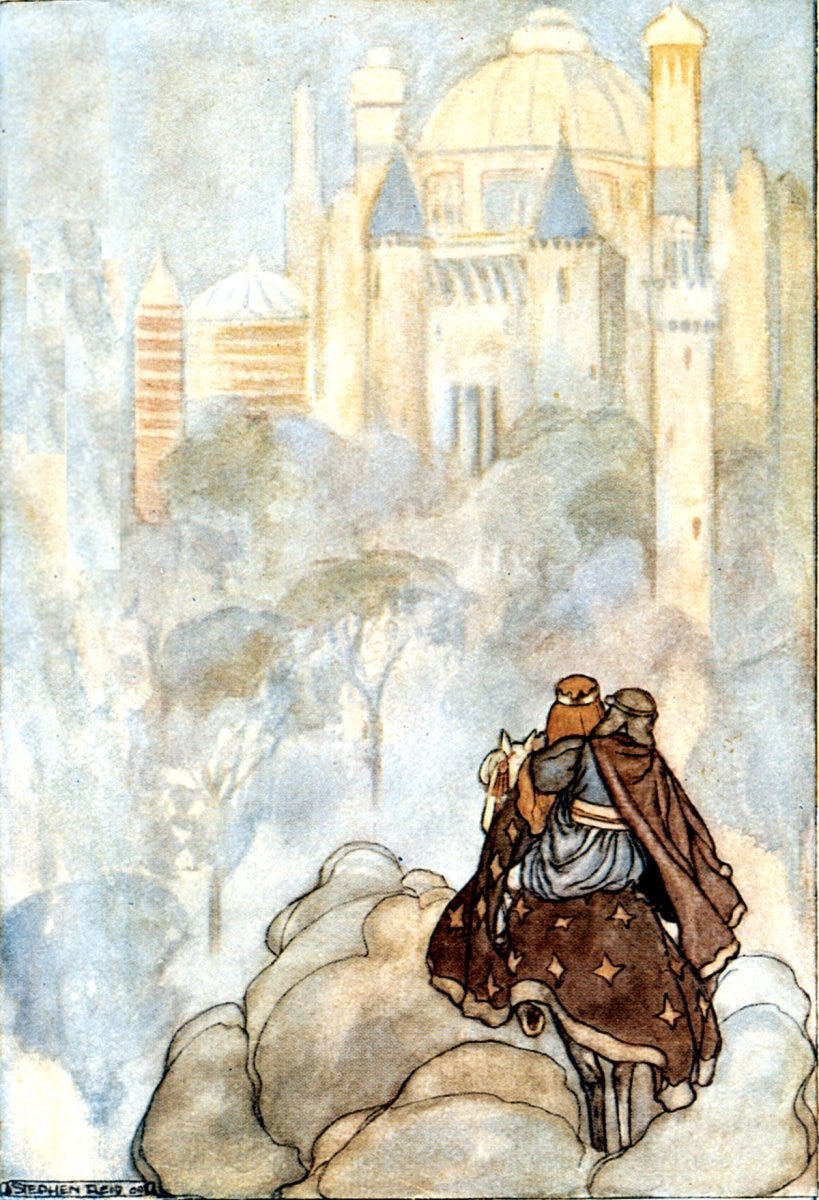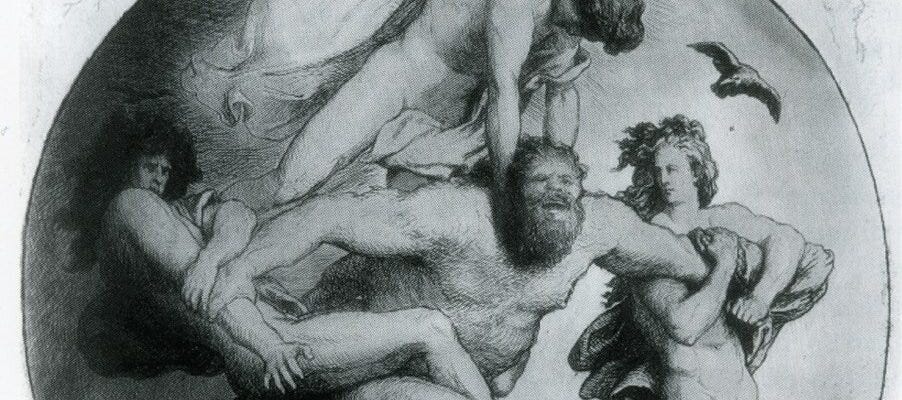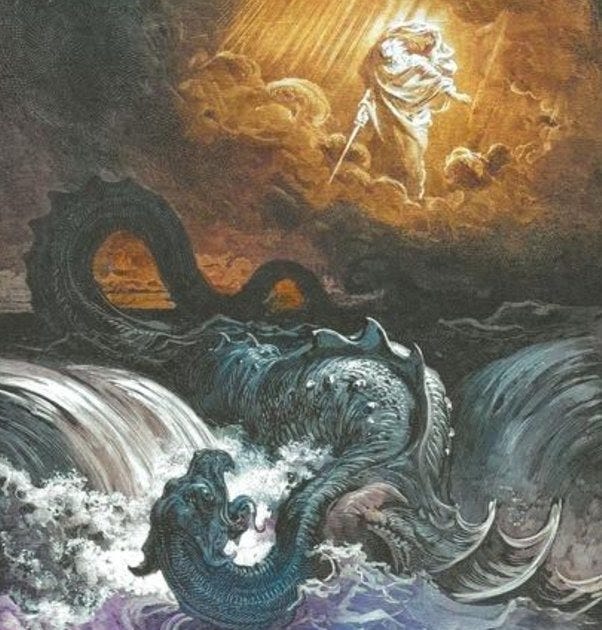Throughout my ‘stack, I have labored to show that our ancestors understood divinity as being closely related to the mundane – that the spiritual precedes the physical, essence comes before substance, the metaphysical before the physical, or the ideal being before the particular being. This concept is the underlying foundation for the entire cosmological and philosophical system of the Indo-Europeans, our ancestors. For many modern people, this traditional mindset is confusing and hard to understand. Modern people have a habit of splitting the material from the spiritual as if the material precedes the other, or they completely ignore the spirit that resides within materiality, and are blind to how it operates in language, speech, action, and nature.
This is to their great detriment, so I will try and explain the differences between the spiritual and the physical, and how this relates to our religion. Our Gods are trying to speak to us through our very language, an inheritance from our pious forefathers. For starters, let us consider the etymology of these two words, according to Etymonline – and remember, the spiritual precedes the physical, and this includes our very words and their true meanings:
late 14c., "pertaining to, of the nature of, or proceeding from God or a god; addressed to God," from Old French divin, devin (12c.), from Latin divinus "of a god," from divus "of or belonging to a god, inspired, prophetic," related to deus "god, deity" (from PIE root *dyeu- "to shine," in derivatives "sky, heaven, god")
Logically, the word "divine" is related the highest physical space on Earth, which is the sky, heaven, the abode of the gods. We should not be surprised to learn that the word directly refers to the Sky Father of the Indo-European conception, *Dyḗus Phatḗr, for all things which are related to the Sky Father are divine, by definition. This is why our households are divine, and why nature is divine, for they descend from the All-Father himself. It has often been stated that the Divine created the cosmos, but what do we mean by "cosmos"?
c. 1200, "the universe, the world" (but not popular until 1848, when it was taken as the English equivalent to Humboldt's Kosmos in translations from German), from Latinized form of Greek kosmos "order, good order, orderly arrangement,"
So, the cosmos is the good orderly arrangement of the universe and the world, and we must assume then that it was arranged by the Divine since they are the powers of the natural domains. From the first comes the latter, since we know the Gods preceded reality and they are aligned to the ideal plane of forms, where all creation comes from, and thus it becomes more clear why the old pagan Gods are deemed demiurgic, since they are indeed taking the chaotic substance and turning into something good and orderly. Now that we know the cosmos comes from the Divine, what about the mundane, then?
mid-15c., mondeine, "of this world, worldly, terrestrial," from Old French mondain "of this world, worldly, earthly, secular;" also "pure, clean; noble, generous" (12c.) and directly from Late Latin mundanus "belonging to the world" (as distinct from the Church), in classical Latin "a citizen of the world, cosmopolite," from mundus "universe, world," which is identical to mundus "clean, elegant," but the exact connection is uncertain and the etymology is unknown.
The ultimate roots of this word are currently unknown, but we can see that all of its usages relate to meaning "of this world, belonging to the world" with some poetic usages relating to cosmopolitan citizens and purity, or cleanliness, elegance, and nobility. We can see how the usages pertaining to the world ended up being used to relate to the form and substance of physical reality since form and substance are foundational building blocks. On the other hand, we can see how the poetic usage could relate to the people of the world, and may even insinuate their nobility or elegance for being natives of such a divine cosmos. This poetic usage also directly insinuates a sort of idealistic order, perfection, or unity within the cosmos. What else could provide this order and purity if not the divinity of the Sky Father?
This is directly experienced through identifying and affirming the deeper functions of nature which create direct reality. The ancestors understood that spiritual ideals are the backbone for material forms. Plato expands on this idea with his Theory of Forms, but we can find currents of this wisdom underlying every cosmological system of the Indo-Europeans. From the popular Substack publication,
:"I would expand the scope of this idealism and propose specifically that traditional religion participates in a specific kind of idealism I would call intellectual realism. Firstly, it places the intellectual agent prior to or in equal standing with the anima or will. Secondly, it supposes the existence of substantial form."
Our ancestors were keenly aware that their ability to perceive reality made them akin to the spiritual matter and greater will that precedes material substance. If reality is structured, and we can perceive the structure, then we must be in close relation to the foundation of the structure. That is what cosmos means anyways, it means order of the universe. However, we don't just perceive structure, order, and divinity, we also perceive chaos, void, and entropy. From the words of the writer
, again:"Matter is a hylomorphism, a combination of form, essence, idea, with substance. The demiurgic intellect triumphs over the residual chaos in the struggle that is known as the Chaoskampf, and beats it into form. Through this, the world is ultimately naturally ordered and human beings are made more good than bad, although through the ignorance or willful malevolence and malice of free agents can chaos triumph. The residual existence of evil (which I hesitate to call it, it’s not necessarily evil) also causes a problem nonetheless, it is something we have to deal with in this world. It preys upon greatness, but also upon itself, which causes a sort of sine wave in the pattern of order and chaos."
This idea of the Chaoskampf – the struggle against Chaos – is a distilled version of the perrennial Indo-European conception of order versus chaos, life versus death, creation versus decay, eucatastrophe versus catastrophe, and the rule of the divine over the chaos of the mundane. It is clearly shown forth in our creation myths where our All-Father creates the cosmos from the chaotic void of pre-existence. Odin does this when he kills Ymir, for example. The divine God takes change (chaos) and uses it to create the cosmos.
The cosmos is ultimately divine in nature since it derives from the Indo-European Sky God, hence the origin and historical usage of the phrase divine creation. However, through our free will, we are intelligent agents and can utilize chaos for our own ends. In other words, we are sub-creators and have the ability to replicate the deeds of our divine father, or go against him to align with chaos. Some argue that animals and other lifeforms are also intelligent agents and can change reality with their actions, and this is clearly true to some degree, but mankind still holds the vast majority of this sub-creative power.
Chaos truly just relates to the inherent degeneration of the mundane, which means that mundane forms contain the capacity for erosion, entropy, and decay. Material form is not perfect and people can choose to be even more imperfect through their actions, this is what sets it apart from the ideal form. However, all things fall within the greater order and will of Divinity, for we are not alone in this struggle against chaos. A great force and power commands the cosmos. That is why the Indo-European Household religion glorifies order and seeks to actualize virtue – we desire the perfection of the ideal spiritual, and we seek to manifest it upon the Earth to defeat chaos. In a way, we are like little boys trying to emulate our father by defeating evil and creating order in our own lives.
Matter was formed by a Divine mind, but by its very nature there is a corruption, or a chaotic decay that occurs. The ideal form is molested and subverted. The perfect value is diminished. This is the struggle, the Chaoskampf.
What are we to do? Some religions teach that we cannot change the molestation of the world and that since chaos is the primordial soup, all of life must eventually return to it. For some religions, they conceptualize this as a form of ascension. Transcendental ascension is very popular among weak humans. They seek to escape the struggle and abandon their households. Other religions teach that their specific god can save them and offer them eternal life in some supposed paradise, if they only abandon their household for the supplication of that specific god.
Our religion teaches that we are members of the divine household, and we have an integral place within the mundane world. We are masters and stewards of the All-Father's creation. We are called to emulate the Divine and create order, to live virtuously, to defeat chaos, and to face death with bravery and honor. We are key pieces within this scheme, and the mundane forms we have are directly inspired by a higher spiritual ideal that creates eucatastrophic order, not catastrophic chaos. Therefore, we have no reason to fear the struggle of mundane existence and the turmoils of the Chaoskampf. So long as we live with honor and virtue, we will be protected in both life and death through our oaths and bonds to our Gods. We have a direct relation to something higher, and we can draw upon that higher power whenever we need to – the All-Father is master of the cosmic household, and he structured reality with us, his children, specifically in mind.
Divinity has been written into the bones of the Earth itself by the All-Father, and this divinity can be interacted with when one understands the Axis Mundi – the center of the world, where the divine and the mundane meet. The Axis Mundi is an ancient concept: for the Proto-Indo-Europeans and the Greeks, it was seen as a World-Mountain and holy peaks, and for the Norse and Germanics, it was seen as a World-Tree and holy groves. These are the foundations of the world, the earth-bones, the pillars upholding reality. All of existence is sustained by the existence of these Axis Mundi, and the lifeblood of different peoples flow from different Axis Mundi. Tibetans have a mountain. The various Japanese clans have springs, mountains, and shrines. These Axis Mundi bind reality together, giving context, order, and energy to the mundane, which would be lifeless, orderless, and dead without these connecting places.
The larger Axis Mundi have their respective lesser versions. This follows the age-old adage of wise sages: "as above, so below" which plays out all across this religion. The All-Father is reflected by the patriarchal House Father. Likewise, the World-Mountain has barrows and burial mounds, and the World-Tree has holy groves and trees. The larger order of the cosmos creates and influences the smaller order of our households, clans, tribes, nations, and planet. There is another popular adage to be dropped here, from Oscar Wilde:
“Imitation is the sincerest form of flattery that mediocrity can pay to greatness.” ~ Wilde
These imitative versions of the Axis Mundi are also known as liminal spaces, which are transitional areas between the divine and the mundane. There are ultimately two types of liminal spaces: those made by the divine powers, and those made by mankind. Those liminal spaces made by the divine powers include cave entrances and passages, mountain tops, hilltops, centers of groves, centers of forests, islands, and springs. Those liminal spaces made by mankind include doorways, hearths, households, barrows, mounds, crypts, tombs, cemeteries, temples, shrines, and wells.
It could be argued that the double-helix DNA structure serves as a genetic representation of the Tree of Life, which renders the DNA into an Axis Mundi, and the body into a liminal space. Perhaps now the adage "my body is a temple" makes more sense? Our bodies are indeed liminal spaces where the divine meets the mundane, deep down in our genetic code, and this connection is the source of our ancestral memory. This is why meditation, prayer, and ritual activity works for humans – our divine souls are housed in our mundane bodies, thereby directly connecting us to the divine source that created us, which gives us access to a well-spring of ancestral energy. This is why a man must seek virtue, for the very quality of his soul depends upon it, and he must triumph in both life and death if he seeks to enter the halls of his fathers.
Hail the Gods! Hail the ancestors! Thank you, and good-end! o///








The “Chaoskampf” story is so archetypal. From my perspective, it’s a reminder that if we allow ourselves to be agents of order—imitating the gods in pushing back chaos—we fulfil our calling. That’s a far cry from the Forest Gump type of modern fatalism, which often says we can’t control anything.
Excellent article brother,Hail the folk Hail the Ancestors